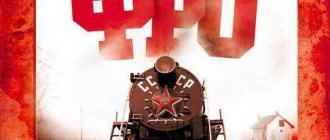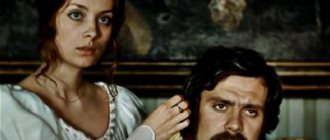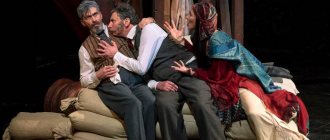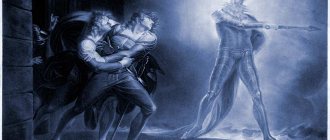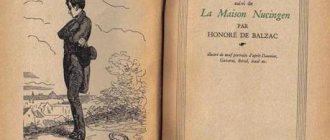Today he is popular, even Andrei Platonov is studied in the literature curriculum. “Nikita” is a short story by this writer, which is recommended for primary school age.
The times have sunk into oblivion when this man, now a recognized classic, was persecuted by loyal literary figures. When a person who creates real national spiritual values was forced to live on his wife’s salary. When his son, in order to cause more suffering to his father, was sent to prison under a far-fetched pretext. When a father took his son, sick with tuberculosis, home to die, he became infected and died himself. Is this why Platonov writes his story so touchingly and in a fatherly manner? He does not follow the path of Bulgakov's satire. But in Platonov’s lines, which are incorrect from the point of view of constructing phrases, one can feel the drama of real artistic power.
Who, if not a writer, is able to connect fiction and reality with the wondrous lace of his imagination? Oddly enough, in the 20th Iron Age, among the wave of custom-made Soviet literature, there were real creators like Andrei Platonov, suffering, but going against the tide, bearing the crown of thorns of the successors of L.N. Tolstoy and F.M. Dostoevsky.
Household fairy tales - what are they?
How much imagination and love for people must a wizard of words who writes everyday fairy tales have! Even the brief content fully reflects all this. “Nikita” by Andrey Platonovich Platonov (the subject of this article) allows you to feel the depth and strength of the author’s talent. The writer worked a lot on his unique author’s presentation, “homemade”, “clumsy”, but surprisingly touching. In his fairy tales there are no wizards and fairies, there are no superheroes. They are inhabited by ordinary people, not ideal at all. However, those who read them still admit that Platonov’s works are magical in their own way, with a special magic of good, which is much stronger than the most “sophisticated” witchcraft.
Platonic style
The peculiar Platonic language of presentation, intertwined with the lexical and grammatical non-standard inherent in children's speech, somehow amazingly holistically creates a picture of a single world surrounding a person. You will feel it by reading the summary. “Nikita” by Platonov leaves the impression that the world of the story is integral, alive, and in it “everything is connected with everything.”
Behind the apparent simplicity of presentation and primitiveness of the plot, one can see the depth and wisdom of Andrei Platonov, who perceives the world through a prism as multi-layered and multifaceted as the classics of the golden period of Russian literature of the late 19th century.
Artistic originality
Those artistic images in the story, which the reader and Nikita’s father perceive as personification, for Nikita are a metamorphosis, a real transformation.
The antitheses of life and death, good and evil, peaceful labor and military work are important in the story.
The reader sees the world of the story through the eyes of a 5-year-old boy. Therefore, such close attention is paid to small objects - flies and spiders, sparrows and grains. It’s as if the boy doesn’t know how to see like an adult, from the point of view of benefit and expediency. He acquires this skill by watching his father’s work.
Source
Artistic features of the narrative
The main character of Platonov's story is a five-year-old boy Nikita. His father is called to war, and his mother earns workdays from morning until late at night to feed herself and her child. The vivid impressions of a child lacking imagination make up a brief summary for this story. “Nikita” by Platonov leads the reader to an awareness of the dramatic contrast between the animated world depicted by a child’s imagination and the actual world: gray, beggarly, wretched. Behind the lace of the author's fantasy, which creates the integrity of the narrative, touching the reader's feelings, one can see both harsh realism and the suffering of ordinary people from the disarray of their lives.
Heroes and images
The main character of the story is little Nikita, who remains the “master” because his father is at war and his mother goes to work all day. Nikita is a creator of myths who populates his world with amazing creatures. The little man lives in an empty barrel in a dark barn. The old well is inhabited by water people, and the deceased grandfather lives in the sun.
Nikita is surrounded by hostile entities. The one who lives in a barrel took the scissors from Nikita's mother. And the harmful well inhabitants actually wanted to drink Nikita’s eyes while he was sleeping. Nikita tries to resist the imaginary creatures, scares them, but is afraid himself. There are snakes living under the wall of the barn, and Nikita tries to appease them with pieces of bread or scares them with the return of his father. But the image of the father does not frighten the creatures. Perhaps because Nikita's father left him as a baby, the image of the father cannot protect the boy.
Nikita talks like a pagan. The sun is good for him; his deceased grandfather lives on it. The boy explains ordinary events for adults by magic. The mouth slurping in the well is not some frog, but a giant and his children.
All objects and phenomena in Nikita’s consciousness are anthropomorphic. A table is a man on four legs. Banka is a grandmother whose head is a pipe. What frightens the boy most is the tree stump. It reminds him of the head of a man sticking out of the ground. His face is gloomy and unsociable, with unblinking eyes. Nikita is sure that the stump has a belly and legs underground.
Nikita invents his own belief in the rebirth of souls, according to which those around him are deceased loved ones. The rooster looks like a shepherd who drowned in the spring. Nikita comes to an important conclusion: the dead do not want to be dead, so the objects are secret people. Dead people climb out of the ground to emerge into the light of the sun. And some, like a stump, succeed. They are unfriendly to Nikita. Neither fence stakes nor burdocks like him.
The world is not hostile to Nikita from the very beginning. The boy commits a bad act, which is why he begins to be afraid of the bathhouse, and the stakes, and the stump. After all, he killed one of the “secret people” - a flower. Nikita picked the flower out of pure curiosity, wanting to see if it had intestines inside.
Seeing milk in the broken stem (the body of the flower), Nikita was convinced that the flower was small and was sucking its mother. The psychology of a child not only allows one to see in a flower a round face with a human expression, “small eyes, a nose and an open wet mouth,” but also to destroy “living breath” simply out of curiosity.
Nikita, who asks the question “Who are you?” about every subject, feels guilty, and therefore accepts condemnation from the grandmother’s bathhouse, the stakes, the hut and the stump in the garden. Even the grandfather-sun is hidden from his grandson by a cloud, however, he responds to the boy’s call.
The returning father immediately notices that Nikita is talking to objects. The soldier immediately defeats the old stump, chopping it for firewood. It is the father who shapes the child’s ideas about the world, explaining that he made everyone up. Father explains the difference between fantasy and activity.
For a father-soldier, the main job is war, but this does not mean that the father has forgotten about his son. He “died and remembered.” Nikita notices his father’s face, hands, medal on his chest and clear buttons on his shirt. In just one day, Nikita learned his father’s life-affirming philosophy: “Everyone works hard, and everyone will be alive.”
Main character
Where to start with a summary? Nikita Platonova generously shares her imaginative vision of the world around her with readers. It mixed fiction and reality. However, there are also touches of realism in the child’s perception of the world.
His mother, working in the field from morning to evening, cannot even feed him breakfast and a full lunch. Nikita is as independent as a five-year-old boy can be. He firmly knows and carries out his daily “tasks”: not to burn down the house, collect chicken eggs, protect “his” rooster from the neighboring rooster-fighter, do not forget to have milk and bread for lunch... Nikita receives hot food once a day only in the evening, when his mother comes From the job. However, the author’s narrative is so captivating that poverty turns out to be veiled behind the screens of children’s fantasies. It is their wealth that Platonov primarily shows in his story “Nikita”. Reviews from readers about the writer’s work reflect increased interest in his work, that he is relevant and in demand.
Contemplation instead of education
On the one hand, the child grows up like a stalk in a field, practically without upbringing, but on the other hand, the main thing in life is already embedded in the boy. He loves his mother, feels responsible for “our household,” remembers his late grandfather, touchingly, childishly associating him with the gentle sun.
Nikita recalls how earlier he was content with contemplating flies, sparrows, and spiders. Since there is no adult to pay attention to him, the child studies the subject, animating it. At the same time, he transfers to him everything he knows about the world of adults. For example, he considers a barrel standing in a barn to be a place where a small man, certainly with a beard, was hiding during the day. Surely, in order to trim this beard, the other day he stole a pair of scissors from the boy’s mother. Generally speaking, he is narrow-minded. Sleeps during the day when millet should be weeded. After all, otherwise the collective farm accountant will not count his workday, and, accordingly, the peasant will not have bread. He clearly included a hint of the collective farm way of life in the village in the story “Nikita” by Platonov. The authorities’ responses to such courage of this creative personality were unequivocal - “kulak henchman”, and Joseph Stalin was even more laconic - “bastard”.
Topic: Problems of A.P. Platonov’s story “Nikita” through a holistic analysis of the work.
Subject:
The problematics of A.P. Platonov’s story “Nikita” through a holistic analysis of the work.
Target
: understanding the moral issues of A.P. Platonov’s story “Nikita” through a holistic analysis of the work
Tasks:
1. teach the technology of analyzing the text of a work of art, 2. develop students’ linguistic sense, logical thinking operations, oral speech, 3. cultivate the moral qualities of each child’s personality.
Equipment:
portrait of the writer, illustrative material reflecting the step-by-step work of children in groups.
Progress of the lesson.
Hello guys. I want to start our lesson with the words of one text. (“Early in the morning, the mother left the yard...” to “... Nikita, five years old.” What kind of text is this? Who is the author? That’s right, you got acquainted with the content of A.P. Platonov’s story “Nikita” at home. And what is the story ? What do you think is more difficult: to retell the content of the text or to analyze it? What do you mean by analyzing a work of art? (the guys’ answers: theme, main idea of the work, problems, image of the main character, features of the language of the text - will then be interpreted as goals lesson) During the lesson, I propose to do this difficult but interesting work. In a notebook, we write down the topic: Analysis of A.P. Platonov’s story “Nikita” and set the following goals (notes appear on the board) and determine the work of our 6 creative groups. Setting tasks group work. Work time 10-12 minutes. No. 1 What do we know about Nikita. Task: 1. Read the plan. 2. Answer each point of the plan, making up a single story. Nikita is the main character of the work... 1. Age? 2. Where does he live? 3. Who does he live with? 4. Why with his mother? Where are grandfather, grandmother, father? 5. Why were you left alone at home? 6. What responsibilities were assigned to him? 7. How did Nikita’s mother tell her to live in a huge world under the sun? 8. Where did Nikita go after his mother left? For what purpose? 9. How did he see the world? No. 2 1. What objects inspired fear in Nikita? (list) 2. Read (briefly from the text) or retell from memory about each subject. 3. Distribute the task among all group members. 4. Summarize by answering the question: What is unusual about the way Nikita sees the objects around him? No. 3 1. Who did Nikita turn to for help when he was especially scared? A) list these items, B) read the characteristics of these items from the text. 2. What else hasn’t scared Nikita? What little discovery did he make? No. 4 Reading the text by role. 1. Distribute roles: author, father, Nikita. 2. Prepare an expressive reading aloud of the passage, starting with the words: “Everyone in the yard was silent...” until the end so that it is pleasant to listen to you. #5 1. Reflect on the question: “What do you think it means to be kind?” 2. Compose either a general text or each one your own. 3. Prepare to read it out loud. No. 6 1. Answer the question: Is the language of the work interesting, simple, or complex? Find and read the means of artistic expression (Epithets, personifications) used in the story. Now let's check the work of the groups. The task of others is to listen and provide assistance. And the conclusions we come to will be written down in notebooks. The following notes will appear on the board and in the notebook: 1. Theme of the story: post-war childhood. It is revealed in the image of Nikita, who learns about the world around him. 2. The main idea of the text: to be kind means to be needed. 3. Problems: eternal problems of good and evil, what to be... 4. Nikita’s condition during the day: (trace through words - orphan, loneliness, fear, good...) 5. The language of the work is complex, interesting, figurative. Homework: Problem question “How do I remember my childhood”, answer in writing
Animated objects around the house
Let's return to the plot of the story... So, the baby ran away from the barrel. It was enough to hear a “hooting” in the distance. By the way, for some reason the little people with which the boy’s imagination populated various objects, for example a well, are almost always harmful. “Kolodyaznye,” for example, the residents, naturally fantasized by the boy, are plump, as tall as a sparrow, wet and aggressive, such people could easily eat the eyes of sleeping children. Why does a child’s fantasy take on frightening forms? The reason is psychological: only the climate in the country, unfavorable for a comfortable life for people, could awaken such associations in the minds of children.
Platonov’s story “Nikita” tells that wherever the baby goes, he is pursued by some entities invented by him. Perhaps they are snake-like, living in burrows. They can crawl into their hut in the middle of the night and meanly sting him or his mother in his sleep. Platonov’s story “Nikita” further takes the boy into the garden, where a stump sticks out, resembling a head peeking out of the ground. This head also poses a threat, but of a different kind. The stump head may well eat all the cabbage in the garden, leaving the boy and his mother without cabbage soup in the cold and hungry winter. The abandoned bathhouse, in which the late grandfather once took a steam bath, resembles an evil, crooked old woman.
The boy was seriously scared. Platonov brings him to the brink of nervous shock. The story "Nikita" further brings the boy's fears to their climax. When, after meeting the stump-head, he lay down on the ground and pressed his ear to it, he heard some voices there. “Yes, they are omnipresent!” — the boy thought about the people living underground. Now even his own hut seemed to him to be grumbling and hostile. Even she didn’t like him and his mother because of the damage they caused, because how much wheat bread was wasted on them!
The child's heart intuitively senses the hostility of the surrounding world.
Plot retelling
The story begins with the mother going into the field and telling Nikita to guard the hut and not play around.
She explains that his father is away now, so the boy will have to remain his master.
Nikita repeats his mother’s instructions and adds that he is afraid to be alone. The mother explains that there is nothing to be afraid of, and then leaves.
Inhabitants of the house and barn
The child is left alone and first goes around the hut. From the upper room he goes to another room, and then goes to the hallway. The inhabitants of the house and yard, already familiar to the hero:
The boy has seen them before, so he gets bored. He goes to the barn where there is a barrel . Nikita thinks that a small man with a beard lives inside. During the day he sleeps, and at night he comes out, eats and drinks. Walking through the barn, the little man sweeps away the straw with his long beard and leaves “stitches.”
The boy knocks on the barrel and tells the mysterious resident that he needs to go to work, otherwise there will be nothing to eat in the winter. But the “idler” does not answer. Suddenly a creak is heard - the sound of dry boards.
The hero thinks that the bearded man is tossing and turning and runs out of the barn.
Conversation with the sun and tree stump
A warm and kind sun is shining in the sky. The boy thinks that this is his grandfather, who was always affectionate. Now the old man lives in the sun and looks out welcomingly from there. Nikita tells him about the resident of the barrel, and then goes to explore the yard. Behind the garden there is a well, from which water used to be taken for collective farm needs. Now it is overgrown because a new one was dug long ago.
It seems to Nikita that little people live in the water . He leans over the frame and looks into the depths. There is something slurping downstairs, the boy becomes scared. Nikita wants to scream, but there is no voice. Then he looks at the sun in fear to make sure that his grandfather is there, and runs to the house. Once at the barn, the hero stops and sees holes going under the wall. Nikita thinks that someone lives there, perhaps snakes. He runs into the hut, takes two pieces of bread and places them at each hole so that the mysterious inhabitants will eat and not come into the house at night.
The child looks around and sees an old stump. He stands in the garden and silently smiles. He has eyes, mouth and nose like a human. Nikita invites the creature to get out and plow the ground. It seems to him that the stump's face has become angry. The boy gets scared and goes into the hallway. It's already hot in the hut.
The hero wants to drink the milk left by his mother, but suddenly notices that the table has also turned into a person, only without arms and with four legs. Then he goes out onto the porch.
Bath and flower
Behind the garden, where the well is, there is a mossy bathhouse. Grandfather used to like to swim in it. Nikita becomes scared again because he imagines the bathhouse as his dead grandmother. The child thinks that the old woman did not die, but turned into a hut. The pipe is a head, and instead of a mouth it has a jagged hole. At this time, a strange rooster comes into the yard, about which the mother said that he needs to be watched so that he does not offend his own.
Father is back
However, there is someone who saves the baby from this omnipresent hostility, Platonov believes. The story “Nikita” immerses the boy in the saving rays of his grandfather the sun. Perhaps this is how the soul of the late grandfather protects his grandson. The baby, caressed by the rays of the sun, calms down and goes home to his mother, who is waiting for him with dinner. He opens the front door and sees that mom is not alone at home, some old soldier is with her. This is a father returning from the war. With short but apt strokes, showing the tormented soul of a loving father (“it’s time to think about you and your mother,” “I will live with you forever”), Platonov (“Nikita”) creates his integral and deep image. The main characters - son, mother, father - are together again.
Option 2
The work is dedicated to the perception of the world and relationships between people. The author poses the problem of the influence on loneliness and activities to transform the world
Little Nikita is always left at home alone. The author hints that the boy lacks live human communication and activity, which are even more necessary at his age for the formation of a personality.
His mother is constantly on duty, and he does not remember his father, because he is at the front. Without communication and not engaged in any activities that develop the mind and imagination, not occupied with anything useful, Nikita uses up his intellectual abilities, indulging in fantasies. He begins to personify objects. Moreover, it is significant that, out of idleness, he populates the world around him with people, some of whom are relatives, albeit imaginary ones. He associates the sun with his grandfather, and the bathhouse with his grandmother. By this, Platonov wanted to show how important communication is for every person and how destructive loneliness and inaction are. The hero of the story in his imagination tries to find something that is inaccessible to him, but necessary.
The author of the story still considers immersion in the world of fantasy to be evil. From fairly harmless substitutes for real contacts with people (however, giving nothing to either the mind or the heart), Nikita, plunging deeper and deeper into the world he is constructing, brings monsters to light. Although they are also imaginary, this does not make them any less terrible. Then imagining scary strangers living in his house, the main character gets scared and runs to his mother, but falls asleep on the way.
Further, the author, probably for contrast, in order to highlight and make his main idea more clear, introduces into the action the father of the boy who returned from the war. Nikita receives from a senior mentor, who is necessary for him for full development, lessons in a normal life. His father includes him in normal life activities - he gives him feasible work, setting him to straighten nails.
Nikita again sees a little man in one of the nails he processed. He rushes to his father with a question, fearing that his fears have returned. However, he receives the answer that it is not the little man in the nail that is evil for him, since he is not invented, but made with his own hands.
The author sought to show that fruitless dreams and fantasies caused by loneliness and lack of communication are harmful, since they lead a person away from the path intended for him by his own nature. Normal self-development is possible only in society and cannot occur without one’s own efforts.
Father is father...
How did the boy perceive his father, whom, in principle, he did not remember? His dad went to the front when he was still an infant. He believed this “old guy.” The boy's soul entered into a kindred resonance with the soul of his father. He believed him and trusted him, like a son trusts his father, he felt that their family was finally complete. How does the writer show all this? Not with numerous sentimental outpourings, but again with one short, precise stroke of the artist. The boy went outside and told everyone that now his father would live with them. How simply and talentedly Platonov writes the story! “Nikita,” whose main characters are integral, deep, created laconically and exhaustively, in a word, masterfully, has become the author’s “calling card.”
Summary
Nikita's father went to war a long time ago, and there was no news from him. Mom had to work a lot because they lived together. Early in the morning she went to the field, and little Nikita, who was only five years old, was left alone.
When leaving, his mother gave him tasks for the whole day. The child had to collect eggs, eat bread and milk and wait for his mother.
When the child was left alone, everything began to scare him. He saw people in every thing. For example, an old tree stump looked at him angrily and scared him. Swamp monsters lived in the well, of which the boy was very afraid. The sun alone made the boy happy - he knew that it was his dead grandfather. He was very scared and everything around him frightened him. Nikita asked his mother to come earlier, but she was far away in the field, so she did not hear him.
The boy lay down on the ground in the yard, but even there he began to see people who wanted to get out into the sun. The boy was very scared, so he could not get to his feet for a long time. But when he gained strength, he ran to his mother in the field. But halfway there he sat down and fell asleep. He woke up when it was already evening. A passing shepherd told him that his mother had long since gone home.
Then Nikita ran as fast as he could towards the house. At home he saw his mother and the soldier whom she was feeding dinner. The soldier took Nikita in his arms and said that he was thinking about him all the time. No matter how hard it was for him, he always remembered his little son.
The father also said that now he will live with them all his life and will not go anywhere. The boy was very happy about this. He was no longer afraid. In the morning, he and his dad walked around their property, and no one else scared the little boy. He told his father about this, to which he said that Nikita is a very kind boy, so he sees people in everything.
They began renovating the house, and dad trusted his son to straighten the nails. Nikita began to succeed in this, which he was very happy about. He asked dad why all the objects have evil faces, but the nail he just straightened has a good face?
Dad explained to the child that he made this nail himself, putting in his own work, and that’s why he is kind. Then Nikita suggested that dad “work hard” so that everyone would be alive. And dad agreed with him. The father knew that he had the kindest son in the world, which is why he called him Good Whale.
Father's education
Now the main character of the story felt differently. Of course, the growing boy missed his father. After all, not only the mother should take part in raising a future man. If a mother's love is always unconscious, programmed by nature itself, a father's love is always objective, socially oriented. We are getting closer to the answer to the question of what Platonov’s story “Nikita” teaches. The first thing the boy's dad did when he returned home was to examine the various instruments. However, we soon become convinced that he is not only the owner, but also the educator. The boy, who drove his first nail under the guidance of his father, notices that he resembles a kind little man. The boy is delighted and surprised - finally, a good creature!
Good and eternal created by labor
The father contributes to his son’s assessment of himself and the world around him. This is exactly what Platonov writes about (“Nikita”). The main idea that he, returning from the front, conveys to his child is that everything created by labor is good. Therefore, work is important. And what is seen and fantasized is fragile, therefore it is often associated with evil. This is how, in simple, simple words, he outlines his son’s priorities in later life.
It is not for nothing that the writer conveys the image of his father to the reader through his attitude to work. This is no coincidence. The father of Andrei Platonovich himself, locomotive driver Klimentov Platon Firsovich, who raised him to be a real worker, did not just respect work. He was twice awarded the title of Hero of Labor. Perhaps Platonov’s story (“Nikita”) was embellished with the words of his father. The main idea of the story concerns the importance of establishing a kind of boundary between fiction and the results of labor. What is created by human hands is durable, reliable, and serves for his benefit.
Kind heart
The kind nail-man became the cornerstone that changed Nikita’s consciousness. At the same time, the father warns with his explanation the possible question of his son: “Is the fantasy world he created good or bad?” The reason is the responsiveness and mercy of the boy, who generously fills the surrounding objects and nature with life. The father approves of this quality of his nature, believing that by preserving it, the son will also preserve his kindness for many years in his future life. These fatherly judgments are deeply humane and wise in their essence, because a dry person, devoid of imagination, as a rule, is also devoid of humanity.
The analysis of Platonov’s story “Nikita” is also valuable from the position of forming in the minds of a five-year-old boy the concepts of male subculture, the direction of his interests, and understanding the main direction of his development through work.
This work, like the entire creative heritage of the writer, became accessible to a wide readership only in the mid-80s.
Conclusion
Readers of this work, of course, feel how deeply the author connects with his characters. Even the summary of Platonov’s story “Nikita” makes it clear what a profound writer, a real engineer of human souls Platonov was. Having fundamentally abandoned party ideology, he placed the personality of a person at the basis of each of his works.
Andrei Platonovich dreamed that everyone would be rich and happy. In the revolution, he saw the impoverishment and duping of people, and in the war - their bitterness.
Moreover, he did not know how to lie, and did not want to write pretentiously. His best works were not published by Soviet publishing houses; he “wrote them on the table.” However, he undoubtedly had his own unique style.
